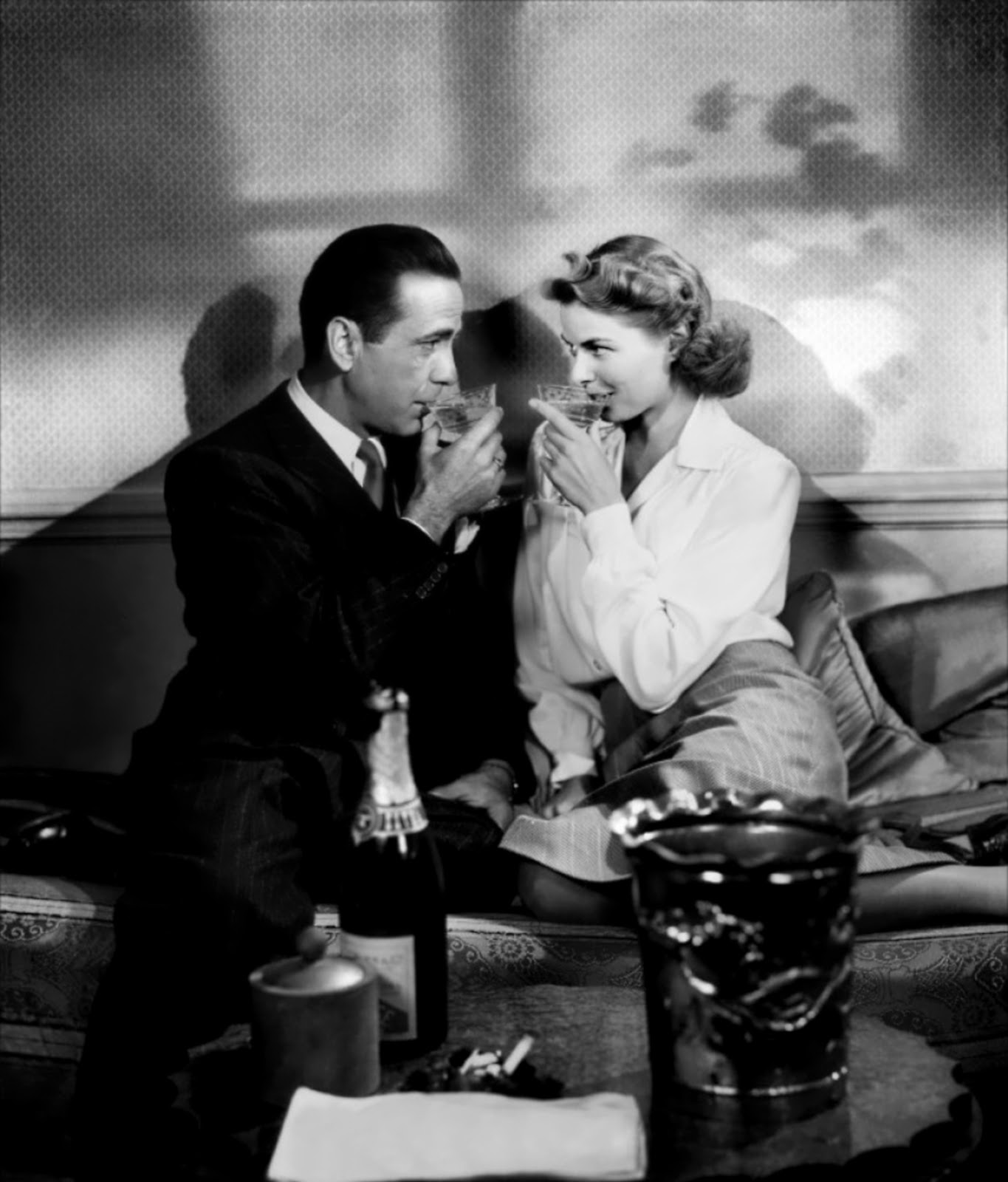This week, I will be analysing Casablanca, a 1942 American romantic drama film directed by Michael Curtiz. The movie stars Humphrey Bogart as Rick Blaine and Ingrid Bergman as Ilsa Lund.
 The equilibrium is seen from Rick's successful business in opening his own cafe, with groups of people with different nationalities - consist of most important figures in society and members of the upper class. Disruption happens when his long lost former lover, Ilsa, arrives at the cafe with her husband, Victor Laszlo. From this moment on, Rick starts facing difficulties and obstacles, his mind disturbed as he discovers he still has strong feelings of affection for Ilsa and it might be reciprocated. Ilsa and Victor need the "letters of transit" in order to flee from Casablanca to America where Victor is able to continue working. The realisation takes place the night when Ilsa finds out the letters are in Rick's possession. She then confronts Rick in the deserted cafe. When he refuses to hand them in, she threatens him with a gun, but a sudden turn of event occurs as she vulnerably confesses her undying love for him. Realisation of disruption is when Rick decides to hand the letters, in hopes that Ilsa would leave Victor for him and stay in Casablanca. He finally realises and comes to his senses that Ilsa could not possibly leave her husband for him as that would make him selfish and at that time that seemed like a rash decision to follow through. In the end, he gave the letters to both of them, wishing them happiness and sacrificing his own. The new equilibrium is achieved as he watched, in despair, their plane flying off, accepting his own fate.
The equilibrium is seen from Rick's successful business in opening his own cafe, with groups of people with different nationalities - consist of most important figures in society and members of the upper class. Disruption happens when his long lost former lover, Ilsa, arrives at the cafe with her husband, Victor Laszlo. From this moment on, Rick starts facing difficulties and obstacles, his mind disturbed as he discovers he still has strong feelings of affection for Ilsa and it might be reciprocated. Ilsa and Victor need the "letters of transit" in order to flee from Casablanca to America where Victor is able to continue working. The realisation takes place the night when Ilsa finds out the letters are in Rick's possession. She then confronts Rick in the deserted cafe. When he refuses to hand them in, she threatens him with a gun, but a sudden turn of event occurs as she vulnerably confesses her undying love for him. Realisation of disruption is when Rick decides to hand the letters, in hopes that Ilsa would leave Victor for him and stay in Casablanca. He finally realises and comes to his senses that Ilsa could not possibly leave her husband for him as that would make him selfish and at that time that seemed like a rash decision to follow through. In the end, he gave the letters to both of them, wishing them happiness and sacrificing his own. The new equilibrium is achieved as he watched, in despair, their plane flying off, accepting his own fate.
As for characters, it is obvious the main characters are Rick and Ilsa as this story mainly circulates around their romance. The hero is Rick, because he was the one who attempted to repair the disruption of equilibrium. The princess is Ilsa as she was the one who needed help (the letters and also deciding to stay with Rick or leave with her husband, Victor) The helper is Captain Louis Renault, who gave Ilsa and Victor permission to leave Casablanca. Major Heinrich Strasser acts as the villain, who tried to intervene, causing Rick to shoot him. Rick and Ilsa's backstory is evidently shown in Rick's flashback of them as a couple in love in Paris. Rick comes across as a tough, strong-willed person, rarely displaying his array of emotions but as Ilsa appears, he turns out to be almost as vulnerable as Ilsa is, giving in and letting his feelings take over him. Ilsa on the contrary, constantly has the perpetual argument on wanting to stay or leave. We see her being completely indecisive and is portrayed as a fickle-minded, unguarded woman.
The closure happens when Rick watches Ilsa and Victor's plane fly off to the distance, leaving him in Casablanca. Despite that, Rick seems to be content with his decision even though Ilsa seemed reluctant on leaving him.
In terms of the clarity of the film, I think the story is pretty self-explanatory in a way that, everything is easy and clear to understand with a brief history of Casablanca being narrated in the exposition. The setting shows us the era of 40's from the costumes and backgrounds, and also the characters mention war pretty frequently which gives us the idea of the age of war, and they engage in them actively.
The theme centrals around romance but also there is a slight sense of bravery of the characters, striving in the early days of World War II. The theme romance was not even lucid at first, as the film focused more on soldiers / nazis and people of different nationalities. You would think it's a movie based on war and historical events but Ilsa is then introduced and everything changes from then, spilling the truth slowly.
Personally, I thoroughly enjoyed Casablanca - despite the heart wrenching ending - and it is, hands down, definitely a must watch movie. Undoubtedly, it beats most of the petty romantic films that are shown in cinemas nowadays.
No comments:
Post a Comment